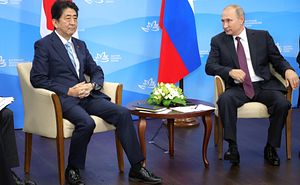Russia is hosting its third annual Eastern Economic Forum (EEF) in Vladivostok this week. With sanctions continuing to harm the Russian economy, the two-day event is an effort on President Vladimir Putin’s part to develop stronger economic relations with East Asian countries and revitalize its economy. The EEF is an annual event held to promote economic development in the Russian far east, which President Putin views as an “absolute priority.” This year it is reported that about 3000 people from 20 different countries will attend. The Japanese Prime Minister is eager to address the territorial dispute and seek for a peaceful solution to promote economic activities on the disputed islands. However, the geopolitical consequence of allowing sovereignty to Japan and Putin’s understanding of the world from a realpolitik lens impedes the two sides from reaching an agreement.
The two leaders are set to discuss five projects for joint economic activities on the four Russian held islands claimed by Japan: aquaculture, greenhouse farming, tourism, wind power, and waste reduction. They will also agree to conduct field surveys to put the projects into practice at an early date. Prime Minister Abe will also request regular air travel by former Japanese residents of the islands so that they can visit their ancestors’ graves. In addition, he will ask for an increase in the number of points of entry to the islands. The Japanese government maintains the stance that the four islands make up an inherent territory of Japan and that the islands were illegally occupied by the Soviet Union after the Second World War. The dispute still prevents the two countries from signing a formal peace treaty after 72 years.
The Japanese and the Russian governments have undergone several talks over the years to negotiate the return of sovereignty back to Japan. Prime Minister Abe and President Putin have already met three times this year. During the summit held in June, Putin was unwilling to be flexible on the islands’ sovereignty. Putin expressed his concern over increased U.S. presence along Russia’s eastern border if Japan regains control of the Kuril/Northern Islands. Putin was referring to the Status of Forces Agreement (SOFA) which governs U.S. military activity in Japan. Under Article II, Section 2, of the SOFA, both the U.S. and the Japanese government can request a meeting to review whether additional areas and facilities be provided by Japan. Therefore, even if Japan guaranteed that a U.S. base will not be made on the disputed islands, Russia will not want to risk another infiltration of its geostrategic buffer zone against the United States. This is the biggest reason why Japan and Russia cannot reach an agreement on the Kuril/Northern Islands or sign a peace treaty.
Prior to the December 2016 visit to Japan, Putin had stressed his view of the sanctions regime as an obstacle to any sort of agreement with Japan. Japan has been a part of the G7 sanctions condemning Russia’s annexation of Crimea in 2014. Despite U.S. and other Western powers’ pressure on Japan to distance itself from Moscow, Japan has attempted to implement relatively mild sanctions for potentially reaching an agreement on the disputed islands. It is not yet clear what the Trump administration’s stance on Japan’s implementation of weaker sanctions on Russia would be; however, regardless of the position the U.S. would uphold, Russia would not want to return sovereignty of the islands to Japan while there is a likelihood of the United States making bases on the islands.
John Taishu Pitt is a recent MA graduate from American University where he focused on security and trade relations in East Asia. His main focus is in Japan.

































